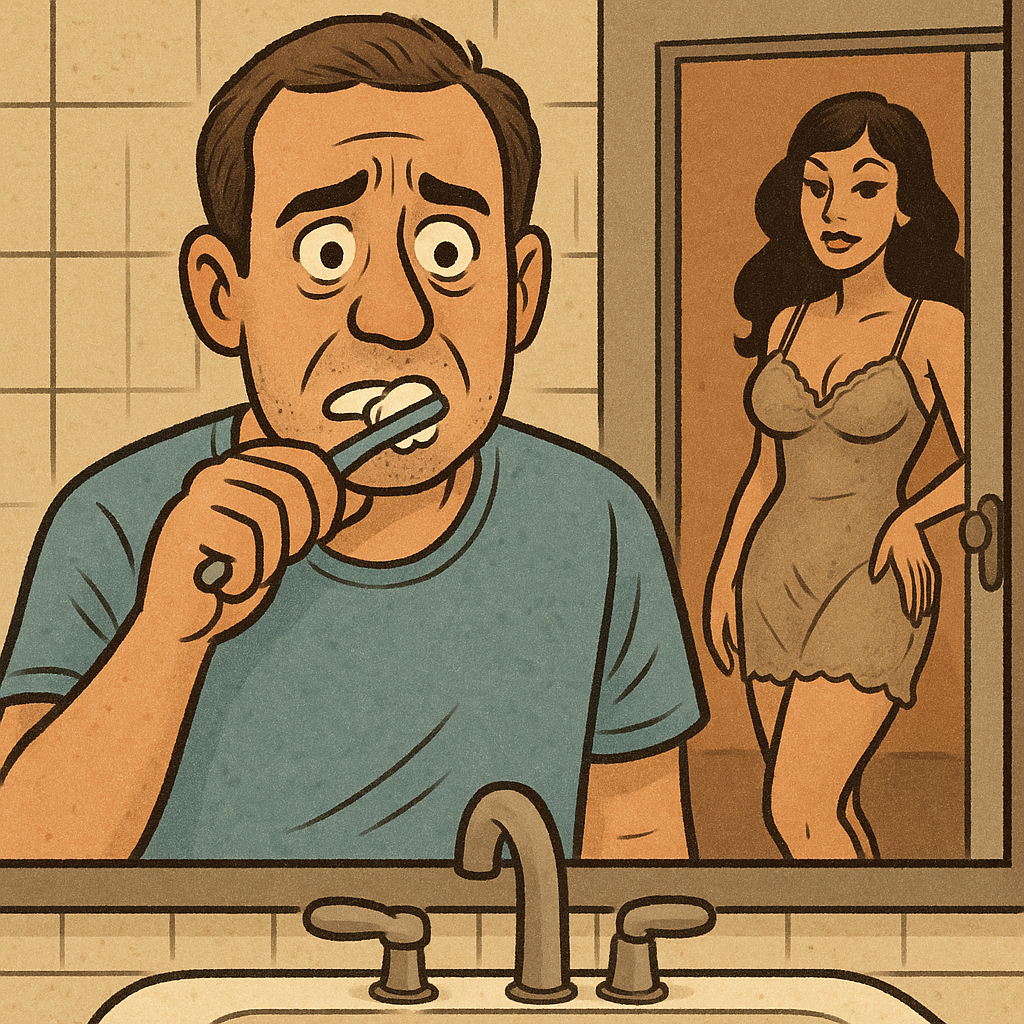BY AARDE WRITES for WEEKLY VOLCANO 10/3/25 |
Hey Aarde, I’m dealing with something that’s really messing with my head. I love my girlfriend of five years, and I still find her super attractive. But lately, when we’re being intimate, I’m having trouble staying “physically present.” No matter how much I want to be in the moment, my body just isn’t cooperating. I’m only thirty-eight, and this doesn’t feel normal. It’s embarrassing, and honestly, I’m worried not just about my own health but about how this might affect her happiness in the long run. I’m scared that she will leave me because of this. I’m planning to see a doctor, but I’ll be paying out of pocket, so I’m wondering if there is anything I could try first (anything free or natural) that might help before I go that route.
Signed,
In My Head
Hey In My Head, The fact that you’re seeking solutions to a sensitive and personal issue demonstrates that you’re a caring and committed partner. Many men ignore or avoid erectile dysfunction (ED) or fall into frustration and critical self-judgment. Blaming your body, your partner, or yourself doesn’t help. You can navigate this phase without shame or guilt by learning what your body is trying to tell you.
ED has many causes, like stress, anxiety, sleep, mental and physical health, and relationship dynamics, which can all affect performance. Even if your partner is sharing with her friend group, it isn’t a reflection of your value but most likely out of concern and guidance. Instead of thinking of it as if they are judging you, think that someone who loves you is seeking outside solutions from trusted individuals. A doctor visit is well worth it to get a baseline on your physical health and can always be more tailored to your health records.
In the meantime, consider going sober, as alcohol and nicotine both affect blood flow and libido. Anxiety and depression are major contributors to performance issues, so check in with yourself emotionally. You can boost your testosterone naturally with regular exercise, as well as curb habits that deplete desire and contribute to performance anxiety in moments of real-life intimacy, such as porn and masturbation.
There is a ton of information online regarding sexual health for men, which can help you reframe this journey positively. I’d suggest following Taoist Qigong master Mantak Chia, who offers an extensive course on YouTube for cultivating sexual energy and connecting the mind to the body’s energy flow. Your body produces nitric oxide, which supports vasodilation (blood flow), so eating nitrate-rich foods like beets, spinach, arugula, Swiss chard, and kale can help. You could also look for food or supplements that are high in citrulline, arginine, and antioxidants. A doctor or naturopath can guide you on supplement safety and customize a plan for your body.
It’s natural to fear your partner may pull away, especially when the sexual connection feels disrupted. Sexual intimacy is a significant facet of a healthy, functioning relationship. But your willingness to find solutions and show up for the relationship is actually deeply attractive. It demonstrates that you prioritize both your own health and your partner’s needs. Consider starting a nongoal intimacy practice. This is when you create space for physical closeness without the pressure of erections or orgasms. Try setting aside fifteen minutes a day for guided heart meditations, a practice that can deepen your connection in ways that aren’t performance based.
When you’re ready, approach your partner during a quiet moment (I prefer bringing up tough issues on walks in nature), and say something like, “I’ve been feeling off in my body and believe it’s affecting our intimacy. I want to figure it out because I care about us. Can we talk about ways to stay close while I work through this?” A loving partner will appreciate the honesty and effort you’re putting forth.
And now, a note for your partner: Your response matters greatly. When your partner is being vulnerable, resist the urge to default to “It’s okay” or “Don’t worry.” Instead, say things like, “I love being close to you no matter what,” or “I always look forward to new ways to connect with you.” Be patient with your partner and avoid pity. Remind him through nonsexual touch that an affectionate connection is possible. Initiate physical closeness without expectation and make space for calm conversations. Everyone knows the feeling of our bodies not doing what they are supposed to, so be sure to stay supportive. And curb the amount you speak to your friends about his journey. Perhaps offer that you will not share his personal health issues with your friends to remain empathetic and respect his privacy.
The bottom line is that you’re showing incredible courage by listening to your body and seeking solutions instead of suffering in silence. A supportive partner will walk this path with you, knowing that intimacy is about more than physical performance; it’s about shared care, effort, and intentional connection.
—This information is for general purposes only, not to be used as medical advice, and does not reflect the views of any sponsors or affiliates.
Submit your questions for Ask Aarde via email to jdaarde@gmail.com.





